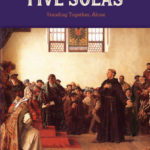Article: No True Religion Without the Fear of God by John J. Murray (original source here)
It is now over sixty years since Professor John Murray, in his 1955 Peyton Lectures, later published in Principles of Conduct (IVP, London, 1957), spoke of the ‘eclipse of the fear of God’. It was such he said that ‘we have become reluctant to distinguish the earnest and consistent believer as God-fearing’.
If that was characteristic of the situation then, how much more so is it true of the present time? Professor Murray was a great admirer of Hugh Martin, the 19th century Scottish divine, who observes in his classic work, The Shadow of Calvary (1875, Banner reprint 1983): ‘I have no personal religion save as I fear God sincerely and supremely’, claiming that ‘Fear is the first principle of all piety.’ Perhaps it is time for us to examine again what is the mark of the true people of God.
IT IS THE FEAR OF GOD THAT IS EXERCISED BY ANGELS AND UNFALLEN MAN
Professor Murray says of the fear of God: ‘It is the reflex in our consciousness of the transcendent majesty and holiness of God. It belongs to all created rational beings and does not take its origin from sin.’ He gives as an example in the adoration of the angelic host in Isaiah’s vision (Isa 6.1-8). The seraphim are overwhelmed with awe and reverence before the manifestation of God’s transcendent holiness. Unlike the prophet Isaiah, however, there is no shame because of sin.
It is true that a fear of incurring the displeasure of the Almighty is a motive in the ministry of angels. It is also a fact that our first parents had the true fear of God before the Fall, for they were created in the image of God (Gen 1.27, 2.9-11). The fear of God was supremely manifested in the perfect humanity of Jesus. His whole life was governed by the fear of the Lord, and it was that fear that controlled his obedience even unto death (Heb 5.7). It was said of Him in prophecy: ‘And the Spirit of the Lord shall rest upon him, the Spirit of wisdom and understanding, the Spirit of counsel and might, the Spirit of knowledge and of the fear of the Lord, and his delight shall be in the fear of the Lord’ (Isa 11.2-3).
IT IS THE FEAR OF GOD THAT WILL MAKE US FLEE TO JESUS CHRIST
The God-consciousness produced in the fallen human heart can only, in the first instance, lead us to be afraid of God and His punitive judgments. We can see this in the reaction of the prophet Isaiah, compared to that of the seraphim. The sinner had to cry: ‘Woe is me! For I am undone; because I am a man of unclean lips, and I dwell in the midst of a people of unclean lips: for mine eyes have seen the King, the Lord of hosts’ (Isa 6.5). After the Fall, we find that ‘Adam and his wife hid themselves from the presence of the Lord God amongst the trees of the garden’. The impulse was to hide from the ‘face’ of God, which they had previously beheld. We are told in the Book of Revelation that there is a day coming when the mighty ones of the earth will call on the mountains and rocks to fall on them to hide them from ‘the face of him that sitteth on the throne, and from the wrath of the Lamb’ (Rev 6.15-17). In contrast with this when the redeemed are gathered home ‘they shall see his face’. (Rev 22.4).
In the case of Adam his newly acquired dread of the presence of God was the reaction of his consciousness to the rupture which sin had effected in the relationship. Murray asks: ‘Is it proper to be afraid of God?’ And answers: ‘The only proper answer is that it is the essence of impiety not to be afraid of God when there is reason to be afraid’. Wherever this consciousness is awakened in a sinner at any time he is constrained to cry out, ‘What must I do? How can I stand before a holy God? How can God’s anger be quenched?’
From the time that God intervened to give the first Gospel promise of ‘the Seed of the Woman’ (Gen 3.15), the only acceptable way for sinners to approach God was through a God-appointed sacrifice. We see it in Abel’s offering being accepted by God and therefore his person, while Cain was rejected (Gen 4.3-5). A propitiation has been graciously provided and when received by faith there is reconciliation and restored fellowship with God. ‘There is forgiveness with thee that thou mayest be feared’ (Psalm 130.4)
IT IS THE FEAR OF GOD THAT WILL MAKE US SEEK PURITY OF LIFE
Scripture leaves us in no doubt that the beginning of knowledge and of wisdom comes from the fear of God. (Prov 1.7, Prov 9.10, Psa 111.10). In that true knowledge of God we are delivered from the fear of terror but retain the fear of reverence and obedience. The Psalmist could say: ‘My flesh trembleth for fear of thee’ (Psa 119.120). Many professing Christians today think that such fear belongs to Old Testament times and that the New Testament rises above that which was represented before the coming of Christ. Nothing could be further from the truth. To quote Murray again: ‘The church walks in the fear of the Lord because the Spirit of Christ indwells, fills, directs and rests upon the church and the Spirit of Christ is the Spirit of the fear of the Lord’. (Principles of Conduct, p 230).
The saint of God is not free from sin. He knows that his sin is displeasing to God and is sensitive to the demands of holiness. He takes heed to the words of Paul: ‘Work out your own salvation with fear and trembling; for it is God who worketh in you both to will and to do of his good pleasure.’ (Phil 2.12-13). He is ready to pass the time of his sojourning here in fear. (I Pet 1.17). The highest reaches of sanctification are realised only in the fear of God (2 Cor 7.1). Says John Calvin, ‘The fear of God is the root and origin of all righteousness’.
‘The fear of the Lord is clean enduring for ever’ (Psa 19.9). The most practical of mundane duties derive their inspiration and impetus from the fear of God, as we find in Ephesians 5.21 and 6.5, Colossians 3.22 and 1 Peter 2.18.
IT IS THE FEAR OF GOD THAT WILL HELP US OVERCOME OTHER FEARS
In the early stages of the Christian life there is often a battle to overcome slavish fear and nurture filial fear. John Bunyan points to the devil as the author of servile fear. The word servile comes from the Latin servus which means ‘slave’, while filial is from filius, meaning ‘son’. We are to have the loving fear of an adopted son to His Father. (Rom 8.15).
‘The filial fear of God is most prevalent when the heart is impressed with a lively sense of the love of God manifested in Christ’ (A Treatise on the Fear of God, Bunyan Works, vol 1, p 483). ‘Perfect love casts out fear ‘, that is, the fear of terror (1 John 4.18). ‘The fear of the Lord was a lovely grace in the perfect humanity of Jesus. Let it be the test of our “predestination to be conformed to his image”.’ (Sinclair Ferguson).
It will also helps us overcome the fear of man. ‘We fear men so much because we fear God so little,’ said William Gurnall. ‘The fear of man bringeth a snare’ (Prov 29.25). There are so many encouragements given us to overcome that fear. God called on Joshua to ‘Be strong and of a good courage; be not afraid, neither be thou dismayed; for the Lord thy God is with thee whithersoever thou goest’ (Josh 1.9). ‘Fear thou not; for I am with thee: be not dismayed; for I am thy God (Isa 41.10).
Alex Motyer says: ‘The command to abjure fear is based on the divine presence ..and divine personal commitment.’ Jesus assures his followers: ‘Fear not, little flock: for it is your Father’s good pleasure to give you the kingdom.’ (Luke 12.32). Hugh Martin exhorts: ‘Beware of ungodly fears. The fear of man bringeth a snare. Full half of the lies that are uttered in the earth are dictated by ungodly fear; and full half of the deeds of unrighteousness are prompted by some ungodly fear. Men will not fear God, and therefore they must frequently be at the mercy of ungodly fear’. (Shadow of Calvary, 219).
‘Let us hear the conclusion of the whole matter: Fear God, and keep his commandments; for this is the whole duty of man’ (Eccl 12.13).



